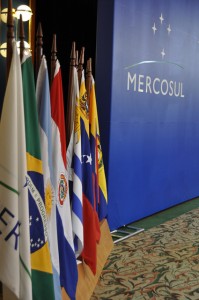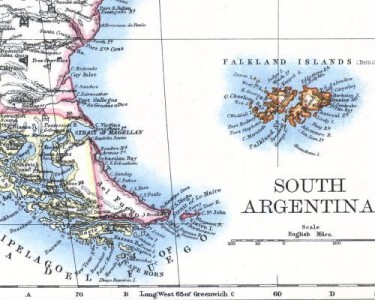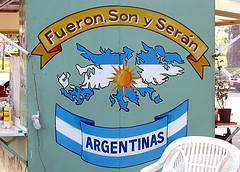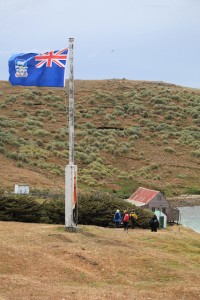[All links lead to Portuguese language pages except when otherwise noted.]
The 30th anniversary of the start of the war that led Argentina and Britain into battle over the Falkland Islands and the recent public statements by Argentine president [en] Cristina Kirchner have sent us back in time to evaluate those events from a new perspective, and thus shine a light on the current implications for Brazil as the largest economy in Mercosur.
Along these lines, Professor of International Relations Gilberto Rodrigues, draws attention to the new geopolitical design within which the dispute over the Falklands now finds itself:
Passadas três décadas, a Argentina segue reivindicando com barulho a soberania sobre as Ilhas Malvinas (“Las Malvinas son Argentinas”) e os britânicos continuam fleumáticos e impassíveis nas Ilhas Falkland. Porém, fatos novos entram em cena e estão alterando o equilíbrio de forças políticas e diplomáticas nesse embate.
This is indeed a new era, and a lot has changed since 1982: the Berlin Wall fell, taking with it the Iron Curtain that separated capitalists from Marxists, the world split up into economic blocs (the EU, Mercosur, NAFTA) and the British victory in the Falklands War cemented the United Kingdom's alliance with the USA, its greatest ally.
In terms of the two economic blocs to which the two countries belong, the European Union is facing its worst crisis since its creation and announced that the dispute over the Falkland Islands is a bilateral issue [en]. Domestically, the United Kingdom is struggling to contain public unrest over policies of cutting public spending. Politically, London is fighting to quell the outcries of the Scottish, who are prepared to go to a referendum to decide if Scotland will or will not continue to be one of the kingdoms that make up this “united kingdom”.
Mercosur is currently experiencing prosperous times due primarily to the growth of the Brazilian economy (which, as Global Voices reported [en] at the end of 2011, has already overtaken that of the United Kingdom), which has been reflected in trade with other members of the bloc. It was in this context that Argentina won the support of its neighbours and managed to get those countries then to close their ports to vessels flying the Falklands flag, amongst other forms of boycott.
In her speech at the last Mercosur summit meeting, the Argentine president referred to the global cause of the Falklands issue. Alexandre Rocha reproduced the news on his blog:
“As Malvinas não são uma causa argentina, mas uma causa global, pois nas Malvinas estão tomando nosso petróleo e nossos recursos de pesca”, afirmou a presidente argentina, Cristina Kirchner, após o anúncio tomado na cúpula do Mercosul, nessa terça-feira. “Quero agradecer a todos a imensa solidariedade para com as Malvinas, e saibam que quando estão firmando algo sobre as Malvinas a favor da Argentina também o estão fazendo em defesa própria”.
It seems that Cristina Kirshner has counted on her country's importance within the South American bloc, especially for Brazil, the country with which it has extremely strong trade links. Ironically, when you put in perspective the evolution of Argentine–Brazilian relations it is clear that the Falklands War was the driving force that encouraged the two countries to grow closer as well as the subsequent creation of Mercosur. Lucas Kerr de Oliveira, a political science PhD student, explains:

40th Mercosur Summit. Photo by the Brazilian Ministry of Foreign Relations on Flickr (CC BY-NC-SA 2.0)
Com o embargo europeu aos produtos argentinos, o Brasil passou a comprar grandes quantidades de carne, trigo e outros produtos produzidos por aquele país. O processo de aproximação resultou em um acordo nuclear bilateral, para fins pacíficos; passo fundamental para acabar com as desconfianças mútuas no plano político-militar. Este tratado foi seguido de uma série de tratados bilaterais no período dos Presidentes Sarney e Alfonsín, que resultaram na criação do Mercosul.
Brazil's support of Argentina after the Falklands War didn't just pay dividends through commerce, but also transformed what was previously a rivalry into a strong alliance, which made significant reductions in defence spending possible. Once the Brazilians no longer feared an “Argentine invasion”, they were able to redirect those resources to the Amazon region.
Once part of Mercosur, this unity led also to the sale of military equipment to Argentina, particularly aeroplanes produced by the Brazilian firm Embraer, which began recently to include Argentine parts, as Michel Medeiros from O Informante (The Informant) blog notes:
A Embraer Segurança e Defesa assinou nesta quarta-feira contrato de parceria com a empresa argentina FAdeA, que será responsável pela produção de spoilers –superfícies móveis de controle de sustentação na asa– e portas do trem de pouso, entre outras peças do KC-390.
Brazil's alignment with Argentina has caused problems for David Cameron's government's strategy of increasing its presence in the emerging country. In that respect, the Ronaldo-Livreiro blog quotes an interview with Peter Lee, an expert on defence from King's College London, for whom the recent visit of British politician William Hague to Brazil “forms another part of this strategy”.
As for Britain's position with regards to the islands, Peter Lee still believes that:
[…] para que tenhamos uma mudança na posição britânica necessitaríamos uma ação econômica coordenada do Mercosul e da Unasul. Nisto o Brasil terá que fazer seu próprio cálculo de custo-benefício na relação com a Argentina, o Mercosul e o Reino Unido. Mas, ainda que houvesse uma política coordenada, não acho que teria êxito e, além disso, em nível comercial e econômico, todos perderiam. O que o Mercosul fez até agora foi a parte mais fácil porque na verdade o acordo de não permitir barcos de bandeira das Malvinas só afeta poucos barcos que também podem navegar com a bandeira inglesa, de modo que foi uma decisão mais simbólica que substantiva.
What is certain is that the current interest in the Falklands has some interesting features, such as national credibility – since wars have already been waged for the islands – proximity to Antarctica, and the existence of oil reserves. In this sense, the Argentines, British and Brazilians foresee a period of economic growth for the islands along with oil exploration, as Professor of Political Science Israel Aparecido Gonçalves indicates in his Real Política Brasileira (Real Brazilian Politics) blog:
[…] há uma perspectiva de forte impacto na economia local. Claro, o governo argentino está preocupado com a escassez do petróleo no mar do norte. A descoberta e exploração de petróleo na região, trará (novamente) relevância às esquecidas ilhas, que por um longo período da história só gerou gastos e produziu lã.
Argentina's integration in Mercosur and the United Kingdom's participation in the EU may have reduced the likelihood of new military conflict, but not economic conflict. Brazil's support of the Argentine cause seems advantageous, but not risk free. If, on the one hand, it wishes to see British competitors for oil exploration on the South American coast pushed aside, the country also seems to have found a privileged position amongst UK investors.
It is now time for Brazilian diplomats to pay close attention to how the issue continues to unfold, especially as this new stage in the dispute is just beginning.









